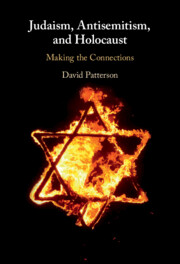Book contents
- Judaism, Antisemitism, and Holocaust
- Series page
- Judaism, Antisemitism, and Holocaust
- Copyright page
- Dedication
- Contents
- Preface
- Acknowledgments
- Introduction
- Part I Judaism
- 1 What Makes Jews Jewish?
- 2 The Stranger, My Brother
- 3 Exile and the Movement of Return
- 4 A Reflection on the Messiah
- Part II Antisemitism
- Part III Holocaust
- Bibliography
- Index
2 - The Stranger, My Brother
from Part I - Judaism
Published online by Cambridge University Press: 24 March 2022
- Judaism, Antisemitism, and Holocaust
- Series page
- Judaism, Antisemitism, and Holocaust
- Copyright page
- Dedication
- Contents
- Preface
- Acknowledgments
- Introduction
- Part I Judaism
- 1 What Makes Jews Jewish?
- 2 The Stranger, My Brother
- 3 Exile and the Movement of Return
- 4 A Reflection on the Messiah
- Part II Antisemitism
- Part III Holocaust
- Bibliography
- Index
Summary
At the heart of Judaism is the most frequently repeated commandment of the Torah, namely the care and the concern for the stranger, for the one who is deemed “the other.” Judaism is the religion of “otherness,” as one can see in the notion of the Jews as “a people apart” (see Leviticus 20:24), as well as in the view that that the non-Jew, the “other,” may be counted among the righteous as readily as any Jew. The basis for this view is that the other is not so “other”: the other, too, is a ben adam, a “child of Adam,” regardless of his or her beliefs, ethnicity, or color. Fundamental to an understanding of the Covenant is an understanding of Jewish teachings on the importance of the stranger or the ger: According to Jewish teaching, there is no Covenant with God without an embrace of the stranger. Next, the chapter notes the commandments regarding the treatment of the stranger, with a closer look at the meaning of the word stranger, in contrast to other words that mean “strange.” Finally, the chapter explores the teachings from the Jewish oral tradition regarding the stranger and the notion of the Righteous among the Nations.
- Type
- Chapter
- Information
- Judaism, Antisemitism, and HolocaustMaking the Connections, pp. 34 - 54Publisher: Cambridge University PressPrint publication year: 2022



